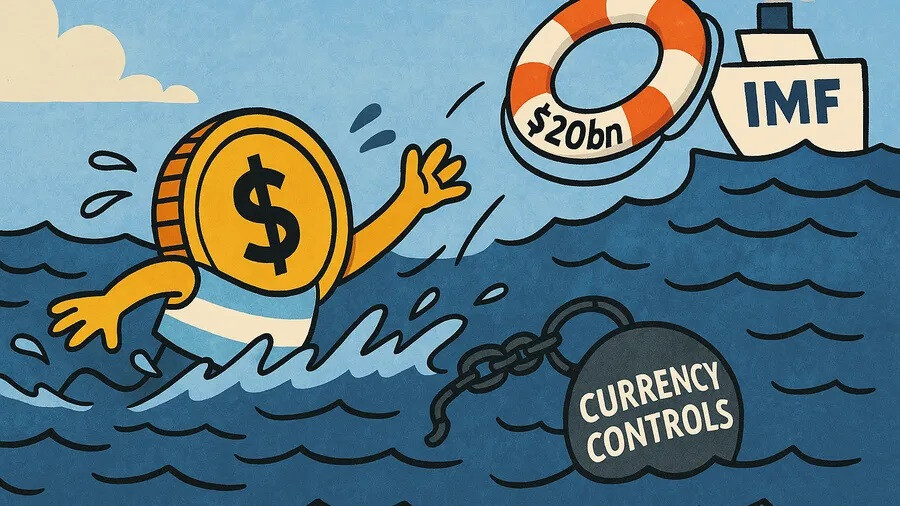
Argentina has agreed to ease its long-standing strict currency controls as a condition for receiving a $20 billion loan from the International Monetary Fund (IMF), increasing pressure on libertarian-leaning President Javier Milei's economic recovery plan.
The Argentine central bank announced last Friday that it would lift currency controls that limit individuals' dollar purchases, while maintaining some restrictions on companies. It will also partially float the official exchange rate of the peso, allowing it to fluctuate between 1,000 and 1,400 pesos per dollar. This compares to the current rate of 1,108 pesos per dollar. The move replaces a controversial monetary policy of devaluing the peso by 1% each month despite high monthly inflation.
Economy Minister Luis Caputo strongly denied that the measures constituted a devaluation of the peso, emphasizing that it was something he had long avoided. He stated that the IMF would transfer $12 billion to Argentina on Tuesday and an additional $2 billion in June, funds that will be used to replenish the central bank's depleted foreign currency reserves and calm volatile markets. "This level of initial disbursement is unprecedented, but so is the fact that a country has met all of the IMF's fiscal requirements within a year," Caputo added.
The IMF board approved the agreement late Friday, and the World Bank and the Inter-American Development Bank (IDB) also announced separate support packages of $12 billion and $10 billion, respectively.
The 23rd IMF bailout agreement for Argentina, a chronic defaulter, has become an increasingly urgent matter for President Milei. The economist-turned-president has succeeded in curbing runaway inflation, reducing the chronic fiscal deficit, and ending a recession, but has failed to lift Argentina's tight currency controls or rebuild the central bank's foreign currency reserves needed to support the peso and repay debt.
This situation has left Argentina vulnerable to a sudden official devaluation, which could reignite inflation and hurt Milei's approval ratings ahead of the October midterm elections. Market turmoil caused by U.S. President Donald Trump's tariff threats has further heightened these risks by negatively impacting Argentine assets as well as the prices of its main exports, soybeans and oil.
The central bank has had to spend $2.5 billion in less than a month to prop up the peso, and the peso's exchange rate in the informal market has weakened sharply since early March, doubling the gap with the official rate to 24%.
The shift in monetary strategy, a key tool in lowering price pressures, "will at least force the government to accept a temporary halt in its efforts to curb inflation, which was a key political objective," analyzed Fabio Rodríguez, director of the Argentine financial consulting firm M&R Associates. "They will have to explain this to voters," he added.
The pace of progress in curbing inflation is slowing. Data released Friday by the national statistics agency showed that the monthly inflation rate in March rose to 3.7%, up from 2.4% in February and well above economists' forecasts, although seasonal factors also played a role.
U.S. Treasury Secretary Scott Besent is scheduled to visit Argentina on Monday in a show of support for President Milei, a close ideological ally of President Trump, whose country is the IMF's largest shareholder and thus held some sway in the negotiations.
China also provided a lifeline on Thursday by renewing a $5 billion portion of its $18 billion currency swap with the Argentine central bank. This line of credit constitutes the majority of Argentina's foreign currency reserves. The Trump administration stated earlier this month that it wanted the swap agreement to "end."
Argentina is already the IMF's largest debtor, owing more than $40 billion from its most recent programs in 2018 and 2022, which failed to stabilize the economy.
However, IMF Managing Director Kristalina Georgieva praised Milei earlier this month for his achievements, namely cutting spending by 5% of GDP in his first year in office, saying he "deserves significant financial support."
"An agreement that provides clarity on the exchange rate could attract more private investment to Argentina," predicted Malcolm Dorson, head of emerging markets strategy at Global X ETFs. "Because investors have rightly been concerned about currency policy, this move could open the door for companies to start putting money back into Argentina, which would make Milei's plan more sustainable," he added.
[Copyright (c) Global Economic Times. All Rights Reserved.]






























